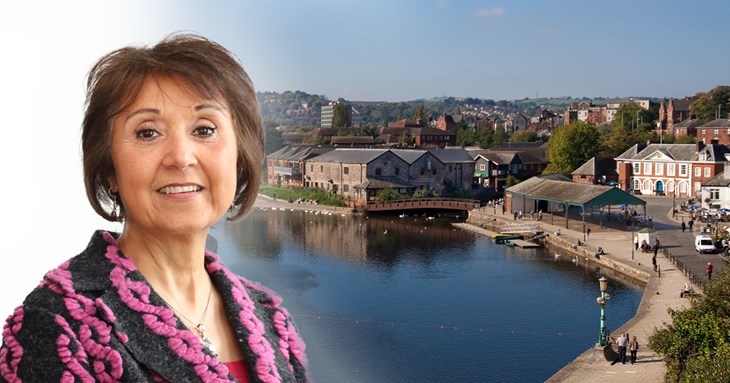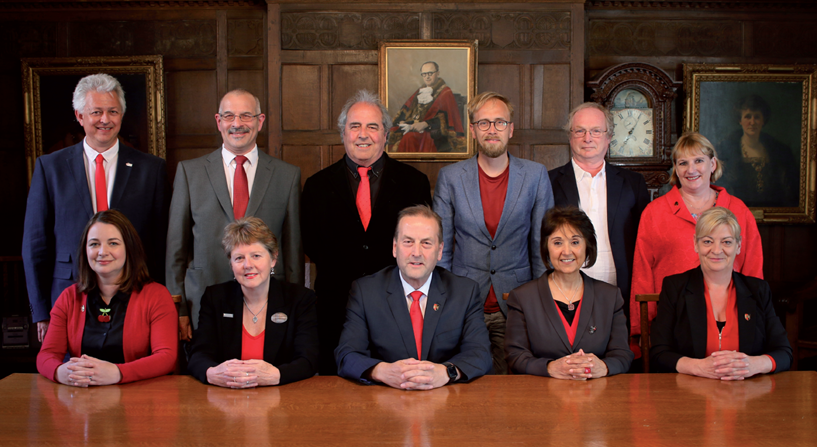Meet Cllr Amal Ghusain
Published: 28 October 2019

Exeter is one of the country’s most successful cities, and at its heart is a vibrant, diverse, and inclusive community valuable and vital to its future.
Helping to make sure that community energy is both encouraged and focussed is one of the many tasks facing Councillor Amal Ghusain, who was elected Exeter City Councillor for Priory ward in May this year, and is the Council’s portfolio holder for Equalities, Diversity and Communities. Her brief covers a wide range of areas including:
- Community safety and anti-social behaviour
- Environmental health, licensing and health and safety
- Equality and diversity policy
- Asset-based community development
- Community and arts grants programme
- Wellbeing Exeter
- Youth Strategy
- Exeter Strategic Board
It is Community with a capital 'C' for Amal, her role covering issues such as tackling deprivation, isolation, healthier lifestyles, anti-social behaviour and even air pollution.
Amal was born in Kuwait, to Palestinian parents who were themselves refugees, forced from their homes in Palestine with the establishment of the State of Israel in 1948. She gained her Biology degree at the American University of Beirut, but came to Britain in the 1970s with her then husband, to escape the civil war in Lebanon. Here in Britain, Amal studied for her PhD, then became a research scientist and lecturer at Kings College, London, and Oxford Brookes University. Later, Amal worked for a further 20 years as a science teacher at secondary schools, finishing her career at Queen Elizabeth’s in Crediton, from where she retired at the end of 2018.
Speaking of her life here, Amal says,
"I have lived in Exeter for 33 years, but as the daughter of refugees, and someone who has also had to flee war and strife in countries I lived in, I have always felt a sense of dislocation; and of not really belonging. When I was elected in May of this year, I felt, perhaps for the first time in my life, that now maybe I really did belong somewhere.”
“I joined the Labour Party three years ago, because I admired the principles and the commitment to working for real, progressive change for ordinary people, rather than for the privileged few. After my retirement, I knew I still had some energy, and, having always taken an active interest in politics, thought I could give something of myself back to the place and people that has made me feel it’s my home."
Being herself from a minority ethnic background, Amal is both cautious about being typecast, but also believes that her equality and diversity role is an important one.
"I believe Exeter is itself strengthened by welcoming people from elsewhere to reside, work and integrate here. The world is an increasingly interdependent one, where we must all respect, value and protect each other and the environment we share, with no-one claiming any more rights and privileges than anyone else.”
“Exeter is generally a place where people not only tolerate, but respect diversity. Of Exeter’s 130,000 or so residents, about five per cent are from ethnic minorities, with the largest minority groups being Chinese, Caribbean and Arab.
Amal says: "I believe Exeter has done quite a lot to include different ethnic groups in building integrated communities, and, for example, the City’s annual Respect Festival in June of each year is now a well established tradition, bringing the community together in a celebration of diversity. There is always more that can be done though."
"Communities are not just about ethnic groups of course. I go around the communities and there are always different events going on. The partnership between the community, local authority and other partners is especially important and particularly when it comes to the health and well-being of residents.”
Amal works closely with Wellbeing Exeter, which brings together public and voluntary sector organisations to deliver a pioneering way of looking after and providing for local people. Around 40 per cent of patients who visit their GP don't need medical treatment. This is where Wellbeing Exeter kicks in with 'social prescribing' as patients are shown how the community, its people, organisations and other assets can help them.
Community Connectors are their first port of call as Community Builders map out what is out there in the way of facilities, events, clubs and other groups and services to meet that individual's needs. It is a way of lessening the huge strains and pressures on health services.
A new 'community grants framework' has also been established by city council which fits neatly with the part the community has to play.
Amal says: "The Exeter Grants programme is about supporting community groups and organisations to work together to address local needs. It’s about helping people to help themselves and each other.”
"The council also has buildings which are available to the community to use for various activities like youth clubs, women’s groups, hobbies and social clubs, health related support groups, Parents & Toddlers groups. It is for them to use in the ways they decide, and what we do is try to help facilitate those activities.”
Amal adds: "The last ten years of Central Government funding cuts have done huge damage to our public services – I believe the public know that ongoing austerity is forcing local authorities to reduce funding. For example, we used to have several youth centres. Now across Exeter we have just two.”
“Many of these services provide vital support to communities. Is it any surprise, if there is little for the youth today in some places, that anti-social behaviour follows?"
She says that this is why providing activities for youngsters is vital.
She says: "There is a need to engage with youth to see what they want. It may be sport or other activities like music, drama, arts and crafts. We know there is a widening inequality gap for Exeter communities in health, employment and access to services. There are six wards lying in the top 20% most deprived in the country."
On combating drugs and anti-social behaviour, she says: "It is about starting much earlier on and having the co-operation of the parents, schools and the community. It needs all the agencies to work together and it needs investment."
She is especially worried about the 13 to 18-year-old age group, and the menace that is County Lines – this is when drug gangs from the bigger cities expand into the smaller areas and communities, often using violence to drive out local dealers and exploit young and vulnerable people to sell drugs. The dealers often use dedicated mobile phone lines to take orders from drug users.

Amal talks of youngsters as young as 13 and 14 being dragged into this dangerous and damaging world. She says: "We do have an issue with this, and we are working with the police, other agencies and communities to try and deal with these issues. We are trying to do something about it."
In her view a Sport England-funded project for Exeter and Cranbrook can only help. The pilot aims to encourage residents of all ages and backgrounds to lead healthier and more active lifestyles.
Amal says: "There are a lot of smaller projects going on as well. Using data, it can be seen which areas are the hardest to reach and warrant special attention. But it is not just about the council - we cannot do it on our own."
Homeless is not part of her portfolio but Amal says: "The need for affordable and decent housing is one of our greatest challenges, after decades of restrictions on Councils building homes. We know this problem can be tackled by the City Council, its staff, members and the agencies working together rather than in isolation. Exeter is a team; that's how we work, and we try to have policies that go across portfolios and departments."
Also on her radar is addressing the city's congestion and pollution problems.
Amal says: "We want to see a city that is vibrant, but with pollution reduced through fewer cars, more cycling, walking and efficient public transport. Exeter can be a greener city, cleaner city, eco-friendly with more investment in education, social care and with more equality. If we keep our sights on that, and don’t allow ourselves to be dragged down by Government or those who sow division, we can do that. My name Amal means ‘hope’ in Arabic, something I believe we must all have!”
